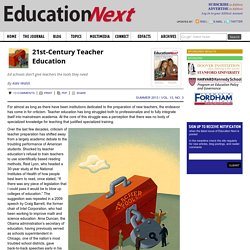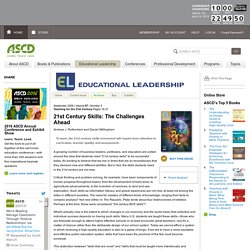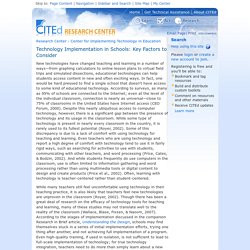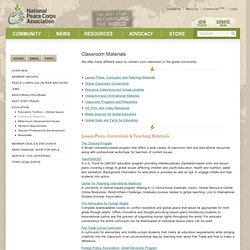

21st-Century Teacher Education. For almost as long as there have been institutions dedicated to the preparation of new teachers, the endeavor has come in for criticism.

Teacher education has long struggled both to professionalize and to fully integrate itself into mainstream academia. At the core of this struggle was a perception that there was no body of specialized knowledge for teaching that justified specialized training. Over the last few decades, criticism of teacher preparation has shifted away from a largely academic debate to the troubling performance of American students. Shocked by teacher education’s refusal to train teachers to use scientifically based reading methods, Reid Lyon, who headed a 30-year study at the National Institutes of Health of how people best learn to read, once stated, “If there was any piece of legislation that I could pass it would be to blow up colleges of education.”
An occasional insider has joined the fray. The Perspective of Teacher Educators Far beyond Semantics • Early reading. Educational Leadership:Teaching for the 21st Century:21st Century Skills: The Challenges Ahead. Andrew J.

Rotherham and Daniel Willingham A growing number of business leaders, politicians, and educators are united around the idea that students need "21st century skills" to be successful today. It's exciting to believe that we live in times that are so revolutionary that they demand new and different abilities. But in fact, the skills students need in the 21st century are not new. Critical thinking and problem solving, for example, have been components of human progress throughout history, from the development of early tools, to agricultural advancements, to the invention of vaccines, to land and sea exploration.
What's actually new is the extent to which changes in our economy and the world mean that collective and individual success depends on having such skills. This distinction between "skills that are novel" and "skills that must be taught more intentionally and effectively" ought to lead policymakers to different education reforms than those they are now considering. Professional Organizations. InstructionalPlanRubric.pdf.aspx. Reinventing American Education. Teaching Strategies, LLC - Early Childhood Curriculum, Assessment, and Training for Educators. Videos, Common Core Resources And Lesson Plans For Teachers: Teaching Channel. Becoming a Teacher By: FORREST W. PARKAY. Technology Implementation in Schools: Key Factors to Consider.
New technologies have changed teaching and learning in a number of ways—from graphing calculators to online lesson plans to virtual field trips and simulated dissections, educational technologies can help students access content in new and often exciting ways.

In fact, one would be hard pressed to find a single school that doesn’t have access to some kind of educational technology. According to surveys, as many as 95% of schools are connected to the Internet; even at the level of the individual classroom, connection is nearly as universal—close to 75% of classrooms in the United States have Internet access (CEO Forum, 2000). Despite this nearly ubiquitous access to computer technology, however, there is a significant gap between the presence of technology and its usage in the classroom.
While some type of technology is present in nearly every classroom in the country, it is rarely used to its fullest potential (Royer, 2002). Professional Development Leadership Resources and Support. National Peace Corps Association. Classroom Materials We offer many different ways to connect your classroom to the global community.

Lesson Plans, Curriculum & Teaching Materials The Choices Program A Brown University-based program that offers a wide variety of classroom text and educational resources along with professional workshops for teachers of current issues. TeachUNICEF A U.S. Fund for UNICEF education program providing interdisciplinary standards-based units and lesson plans covering a range of global issues affecting children and youth–education, health and nutrition, water and sanitation.
Center for Teaching International Relations A University of Denver-based program offering K-12 instructional materials, books; Global Resource Center; Online Bookstore; World Affairs Challenge; Graduate courses related to global teaching. The Advocates for Human Rights Complete downloadable course on conflict resolution and global peace that would be appropriate for ninth grade through adults.
The Cyberschoolbus U.N.